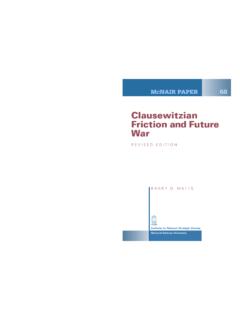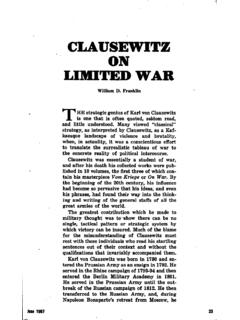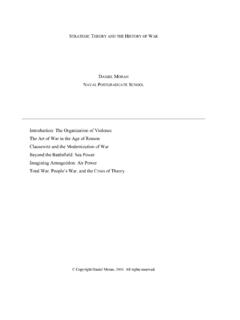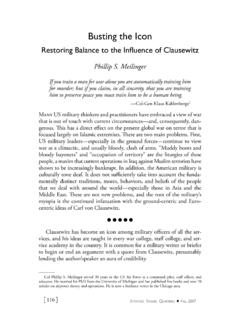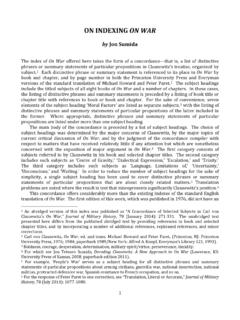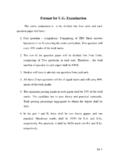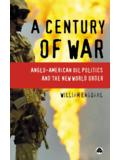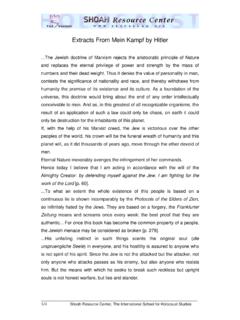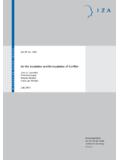Transcription of Clausewitz's Categories of War and the …
1 N clausewitz s Categories of War and the supersession of absolute War 1 Christopher Bassford JAN 2017 ESSAY STRUCTURE Introduction Synopsis A Central Problem: The Infinite Variability of War in the Real World and the Search for Structure Issues of Translation and Tone The Failure of absolute War as a Construct Book I: A New Construct An Excursion into the Tactical Realm Conclusion ot long after the US invasion of Iraq in 2003 but long enough for almost everyone except the Bush White House and the Department of Defense to recognize that the occupation of Iraq was not going as promised I had an opportunity to receive an authoritative briefing on the progress of Operation Iraqi Freedom.
2 The first line of the briefing was As you know, our objectives in Iraq have been quite limited. 1 This is the current version of a working paper on this subject that I plan to nurture in a manner similar to Tip-Toe Through the Trinity: The Strange Persistance of Trinitarian Warfare, , which has been a useful learning tool for myself and has been reasonably influential on the subject of clausewitz s trinity. An earlier and shorter version of the present paper will be published in Future Wars: Storia della distopia militare, ed. Virgilio Ilari [President, Societ Italiana di Storia Militare] (Acies Edizioni Milano, 2016).
3 Here I must acknowledge a particular debt to Jon Sumida, with whom I have been engaged for several years in a pointed but amiable debate over many related issues. I am also indebted to Vanya Eftimova Bellinger for many sources and for her rich perspective, to Dennis Prange for his deeply informed assistance with clausewitz s German, and to Mgr. Sebastian P. G rka, Faculty of International and Political Studies, Jagiellonian University in Krak w, for many useful observations. The errors that no doubt remain are, of course, my own. 2 It is difficult to recount this occurrence without lapsing into incredulous sarcasm.
4 Yes, we will invade and occupy this alien state; thoroughly destroy its military forces (those not killed will be disarmed and thrown into the street with no jobs, pensions, or futures); exterminate the ruling dynasty; hunt down its other political leaders; remove the entire ruling political party from influence; displace the entire traditional ruling ethnic group; and radically change the state's political, legal, and economic systems. In the process, we will utterly alter the geo-political balance of power in the region. And then we will see an explosion of democracy throughout the Middle East.
5 In what universe, one might well ask, could such intentions constitute "limited objectives"? Let me pause to note that these briefers were not dunderheads. Two of the three military briefers had PhDs. All had extensive experience both in Joint military operations and on high-level political staffs (including the White House and Congressional staffs). All were graduates of intermediate- and senior-level military schools and all had actually taught at the War College level, where the curricula routinely included seminars on the theories of Carl von clausewitz and on "Limited War" (usually a case-study of the Korean War, 1950-53).
6 Clearly, the briefers were attempting to apply Clausewitz's concept concerning the variable relationship between political objectives and military objectives. And yet they were quite unable to make any sense with it. Unfortunately, such confusion is There are various ways to explain Americans inability to grasp or, more likely, simple lack of interest in clausewitz s strategic-analytical framework. In the American military tradition, the misleading term limited war is associated with the constraints placed on war-making during the Cold War by the ever-present fear that localized conflicts might escalate to a war between the superpowers, possibly leading to an all-out nuclear exchange.
7 In that context, the Korean War first introduced the term into the broad American strategic discussion, and even then the notion was given a mixed reception at best. Today, with that nuclear threat seemingly removed, the need for a category of limited warfare has presumably gone away. Or perhaps a limited war is a conflict limited to some particular geographic theater (as was the Korean War) its opposite being global warfare, nuclear or not. In that case, perhaps the take-down of Saddam s state was limited, even though it was explicitly about regime change, because all of the fighting took place in one (foreign)3 country.
8 We weren t trying to change the world, only Iraq except that the presenters mentioned above were not talking about our objectives in the world, only about our objectives in Iraq. In seminar discussions with my many military students, I find that the 1989 invasion of Panama is almost universally called a limited war, simply because it was easy and cost so little. Thus the critical issue is the level of resources to be expended rather than the nature of the political 2 There are certainly exceptions, especially among military scholars. For some reason the faculty of the US Naval War College, for example, has long been an oasis of sensible understanding on this subject.
9 But I am discussing the broader national security culture, not simply the realm of academic specialists. 3 Presumably a similar fight on American territory would not be described in such t erms. 3 and military objectives sought. I have also noted a persistent inability, or perhaps it is merely a deep reluctance, to distinguish political from military objectives. Such considerations seem to underlie the logic in American thinking on the subject today. That does a lot to explain the general incomprehension of clausewitz s terminology and, just possibly, the pervasive American conceptual failures underlying our debacles in the Middle East and elsewhere.
10 It is nonetheless true that much of the explanation for the widespread confusion must also be attributed to clausewitz himself. He was an eclectic, experimental thinker who ruthlessly tested his own evolving theories about war. If they failed his tests, he revised them. As a result, his concepts and the terminology he used to describe them changed over time. His most famous work, Vom Kriege (On War),4 which is divided into eight books, was compiled posthumously from a set of sporadically revised manuscripts of varying and uncertain dates, written most likely between 1816 and 1830.


